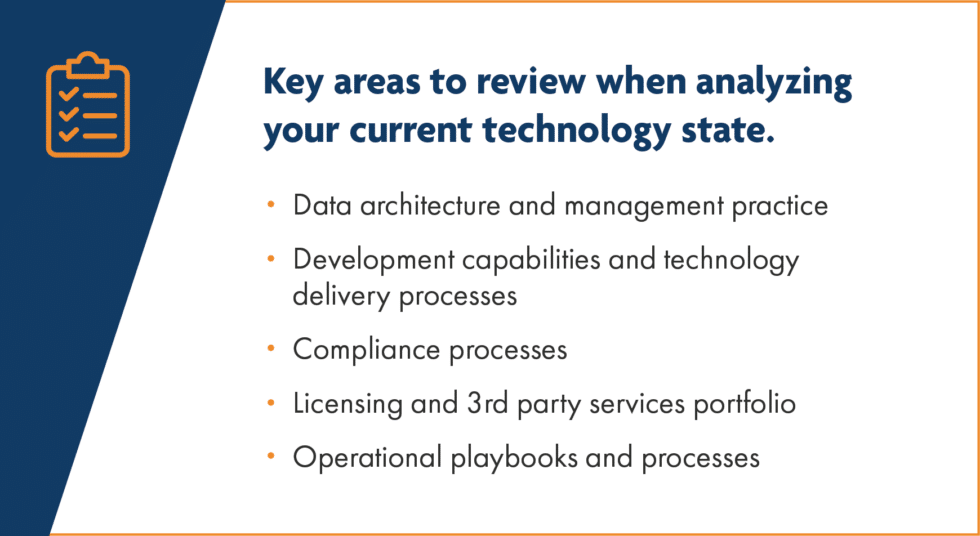TAKE A DIGITAL MATURITY EVALUATION
Effective deployment and use of digital tools and services underpins the success of every organization today. But while the right technology can give you a competitive advantage, most organizations find it difficult to keep up with the sheer pace of technology change. Finding the appropriate level of investment in digital tools, skills, and processes is among the most pressing and challenging issues for today’s leadership teams. These challenges can be faced head-on and often overcome by conducting a thorough technology assessment.
Regular technology assessments ensure continued strategic alignment between business strategy and digital investments. When undertaken effectively, a technology assessment will:
- Improve business operations
- Enhance customer service
- Reduce time-to-market for new products and services and, most critically
- Ensure your organization’s capabilities enable future growth and mission objectives
When should you conduct a technology assessment?
Frequently reviewing your technology landscape will allow you to track progress in aligning your capabilities to the evolving needs of your operating model. And by regularly assessing technology capabilities, you’ll maintain a clear investment roadmap that aligns the stakeholders and partners who drive and benefit from those investments.
Other signs that it’s time to perform a strategic technology assessment include:
- When considering a major technology investment
- When your business is experiencing significant, above-normal growth
- When market dynamics change due to disruptive use of digital strategies by competitors

There are three steps to a typical technology assessment. Let’s talk about them:
1. Analyze Your Current Technology State
As with any decision-making process, there has to be an information gathering and analysis of data. It doesn’t have to be a cumbersome and painstaking process. If done right, the analysis can be quick and effective.

While you can try to do this step on your own, experience tells us that you’re likely to get blinded by two factors: confirmation bias and, if you’re not a CTO, lack of experience. Enlisting outside help is common for many organizations.
It’s essential that these technology assessment interviews are conducted by an experienced CTO with the deep operational experience needed to ask the right questions and use insight to separate the aspirational from the actual. An outside perspective also helps keep things objective, so confirmation bias doesn’t creep in — where the search becomes only for the information we want to find.
In these assessments, you’ll also want to review data architecture and management practice, development capabilities and technology delivery processes, compliance processes, licensing and 3rd party services portfolio, and operational playbooks and processes..

When this step of the technology assessment is complete, you’ll have a clear picture of the baseline capabilities along with a better understanding of potential gaps between what was expected versus what’s actually there in terms of people, process and technology.
2. Diagnose Your Technology Needs
With the analysis complete, it’s time to map the current-state portfolio of capabilities to strategic business and market growth objectives. This allows you to prioritize among the various technology implementation options and create a phased schedule for any investments.
From there, the next step will be to identify gaps or misalignment in capabilities, technology operating plans, service portfolios, technical architecture and platform strategies.

Once the diagnostic phase is wrapped, you should have an understanding of where the opportunities lie and where you may have potential gaps in technology capabilities.
3. Align Your Technology Plan
The alignment phase is where it all comes together. In this phase, you’ll need to develop a plan to address gaps likely to impact growth or undermine investment hypotheses, including:
- Forward-looking viability
- True ability to scale
- Compliance
- Governance
- Security
- Other identified risks
If you work with a team like Mod Op Strategic Consulting, this is the stage where you’ll get a detailed report that includes a roadmap for practical, risk-mitigated, technology capability enhancement. If you’re attempting this on your own, you’ll want to make a report so you can share it with your team and plan next steps.
Upon completion of the three technology assessment phases, you should have a 360-degree view of your technology capabilities from the perspective of:
- Hardware
- Software
- Networking
- Data
- People and processes
All with clear recommendations for mitigations and other changes needed.
Ready to Schedule Your Technology Assessment?
Over the last several years Mod Op Strategic Consulting (Mod Op Strategic Consulting) has led technology assessments for dozens of clients. With these quick and effective technology assessments, led by our CTO, we take care of each phase resulting in a comprehensive blueprint to help you align your business strategy with your digital investments.
If you’re due for a technology assessment, grab a copy of our technology assessment checklist, and reach out to our team for a free consultation call.
The Latest
We study the game as hard as we play it.
Learn with us what’s now and next.

